Four Days and Beyond – Remembering JFK Fifty Years Later
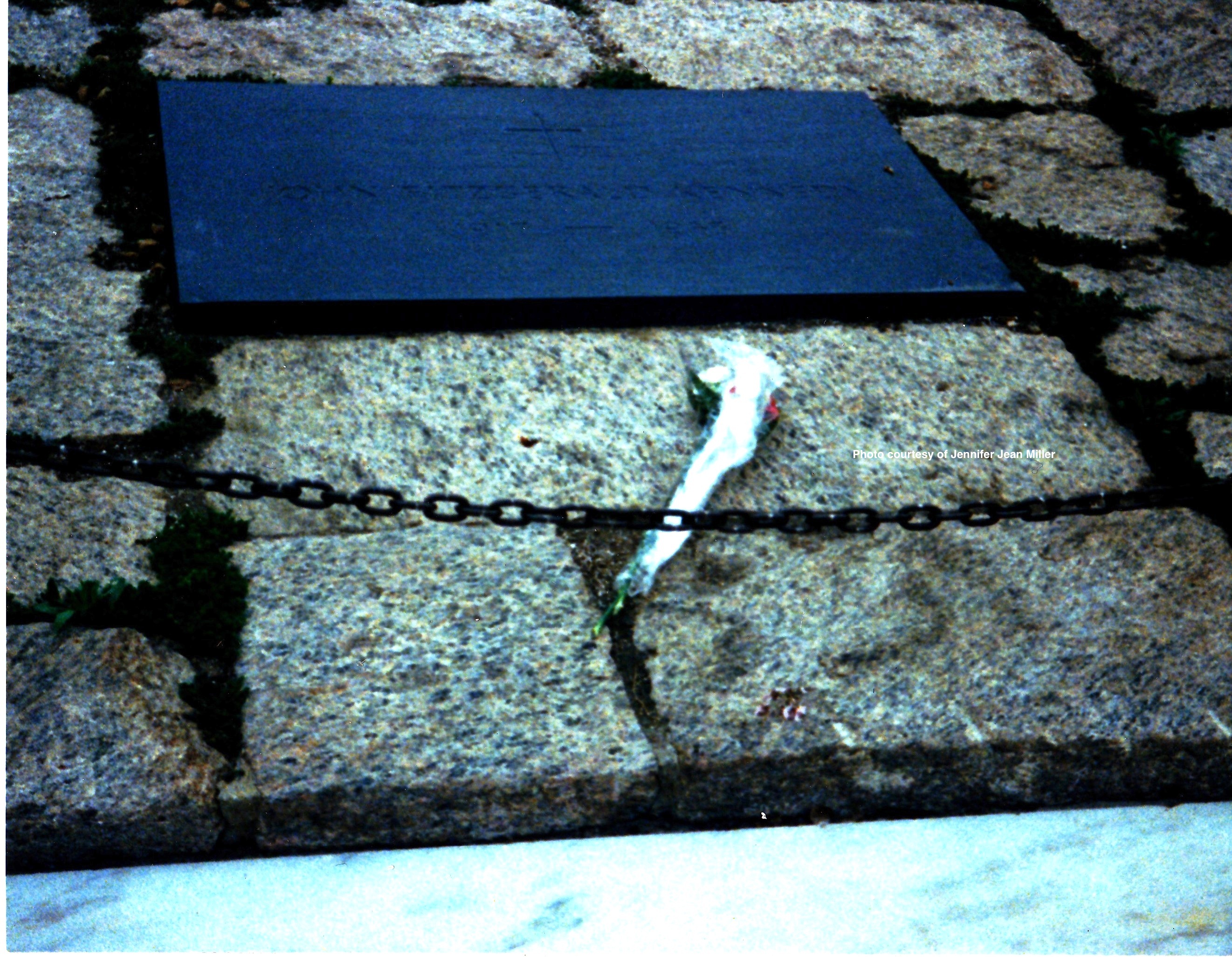
Flowers placed on JFK’s final resting place, photo courtesy of Jennifer Jean Miller.
SUSSEX COUNTY – She steps up to the counter at the florist and places her order.
“Yes, I’d like two carnations please, one white and one red,” the teen requests shyly, as she looks around at the many arrangements and gifts.
The floral designer hands the girl a cello wrapped small spray of flowers that she had pulled from the refrigerated case and prepared for her, and takes the few dollars for the assortment. The young woman nods as she thanks the florist, then heads out the door, a nervous pit in her stomach.
She knows it is a small gift for such a great man of character, yet she feels it is a fitting tribute to show her devotion to a person she had never met. But she has always admired the person who was gunned down in cold blood, many years before she was born, and a little less than 25 years earlier from the balmy spring day that Easter weekend in 1988.
Although she is simply looking at a grave, she is still nervous for this trip. Her heart pounds as she makes her way through the crowd and solemnly looks down at the dark stone, which is one earthly reminder that he existed. It appears plain, with only his name, and year of birth and death. At the time, his lady love had not yet joined him in her forever rest, yet she was symbolically there already with her eternal tribute to him — a flickering flame which waved from side to side, and remained from the day she first ignited it.
The young woman gently closes her eyes, feeling the lump fill in her throat, and that sensation wash over her as one does when emotion overtakes them. Her face becomes flush, and suddenly her eyes overflow, and the tears begin to stream like rain making its way down a window on a stormy day.
She slowly kneels down and lays the flowers behind the chain, and below his nameplate, the only floral tribute left in spite of the pack of visitors. Overcome with feelings that she was in the presence of the final resting place of such greatness, and annoyed that no one else had thought to leave a memento, the young woman can think of nothing more than to break away past the crowd, who seem puzzled by the girl in tears, and who knew not of what she was thinking. She was simply overwhelmed with sadness at the young and accomplished life that was snuffed out too soon, unlike the flame tribute left behind that had never stopped waving since it was lit almost 25 years prior.
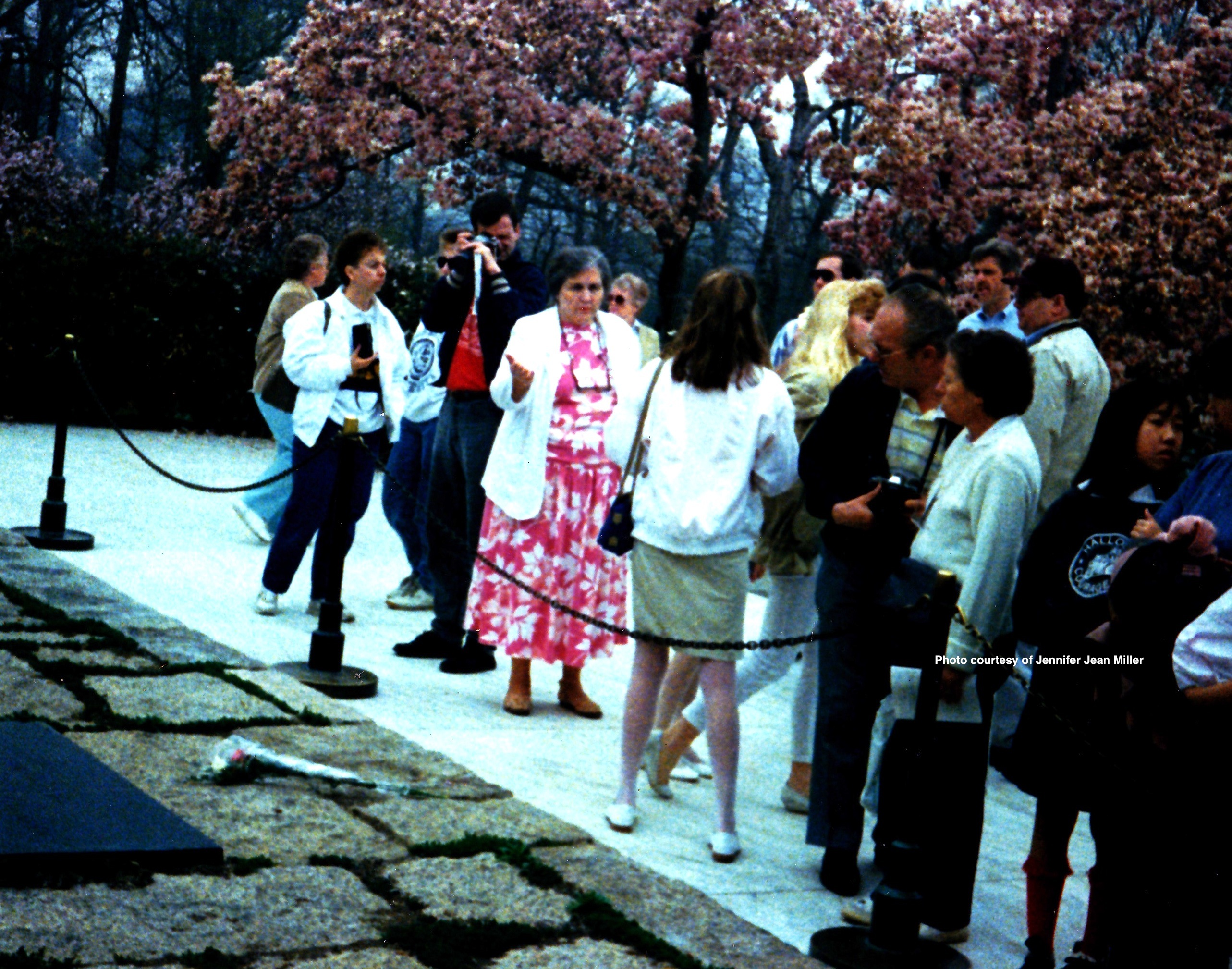
A blonde flash as the author of this story is photographed, after leaving a floral tribute on the grave of JFK. Photo courtesy of Jennifer Jean Miller.
And today as she types on a Friday, the 22nd of November — the same sequence on the calendar as his final day on earth, 50 years ago, the same girl, now more than 25 years older than the only time she was able to pay her respects to him, feels the sting of the tears once again, as she has interviewed those who admired John F. Kennedy in their own lifetimes.
Though JFK was long gone before I entered the world, I have always admired him for the indelible mark he etched on the hearts in our nation. He did not think of the moment –- he thought of future generations, like mine and my children’s, and my children’s children’s, in the decisions he made daily while in office.
I feel if JFK had the chance to live, he would have continued to accomplish great things, and would have lived out his life as a statesman who would have made the world a beautiful place. His death, in my opinion, changed the course of the 1960s, as well as the course of history, creating a place where unrest, anger, and confusion existed, in place of the Camelot he generated.
One of my first memories of JFK, was not from a news reel, but an image, one that was made prior to my birth as well and before his death, and that has traveled across the globe from foreign soils. From there, I have always held an admiration.
I would like to thank those who so graciously shared of their hearts, their photos, and their reactions to that tragic day, and the four days it encompassed, from JFK’s death and funeral. Not to mention, the lifetime impact this event left on you. Thank you Joel, Hank, Mike, Jessi, and Bill, for taking all of us there…those who lived through it, and those like myself, who had not been born yet, who never had the chance to meet the great man identified by the tree letter acronym of his initials, “JFK,” as if he is someone who was a family member or friend.
This article is dedicated to the memory of JFK…thank you for thinking of me, and so many others, though we were not even born yet. I could only afford carnations that day, but my heart is abloom with a garden of roses in gratitude, watered by my tears as I reflect on the tragic way you were taken from the world, and how much there was, and still is, left to do. Thank you for beginning it. – JJM
“All this will not be finished in the first 100 days. Nor will it be finished in the first 1,000 days. Nor in the life of this administration. Nor even perhaps in our lifetime, on this planet. But let us begin.” – JFK in his inauguration address
Joel’s JFK Memories
Joel Aronson is someone that I know well, because he is one of the responsible parties who brought me into this world. My first “vision” of JFK came from a relic he found one morning while stationed in Taiwan.
Joel worked in Airforce Intelligence as a Chinese Linguist, having originally wanted to pursue photography, but who the military instead sent for training as a Chinese linguist to Yale University. He lived in Taiwan (then referred to as Formosa, later named Taiwan, with “Tai” meaning “tower” and “wan” meaning a “bay” or “cove.”).
As a member of the military at this time, my father was there to monitor the activities of the Chinese Communist Airforce on Mainland China, to ensure that free countries were protected. He began his term of service there in 1958, concluding it in 1962.
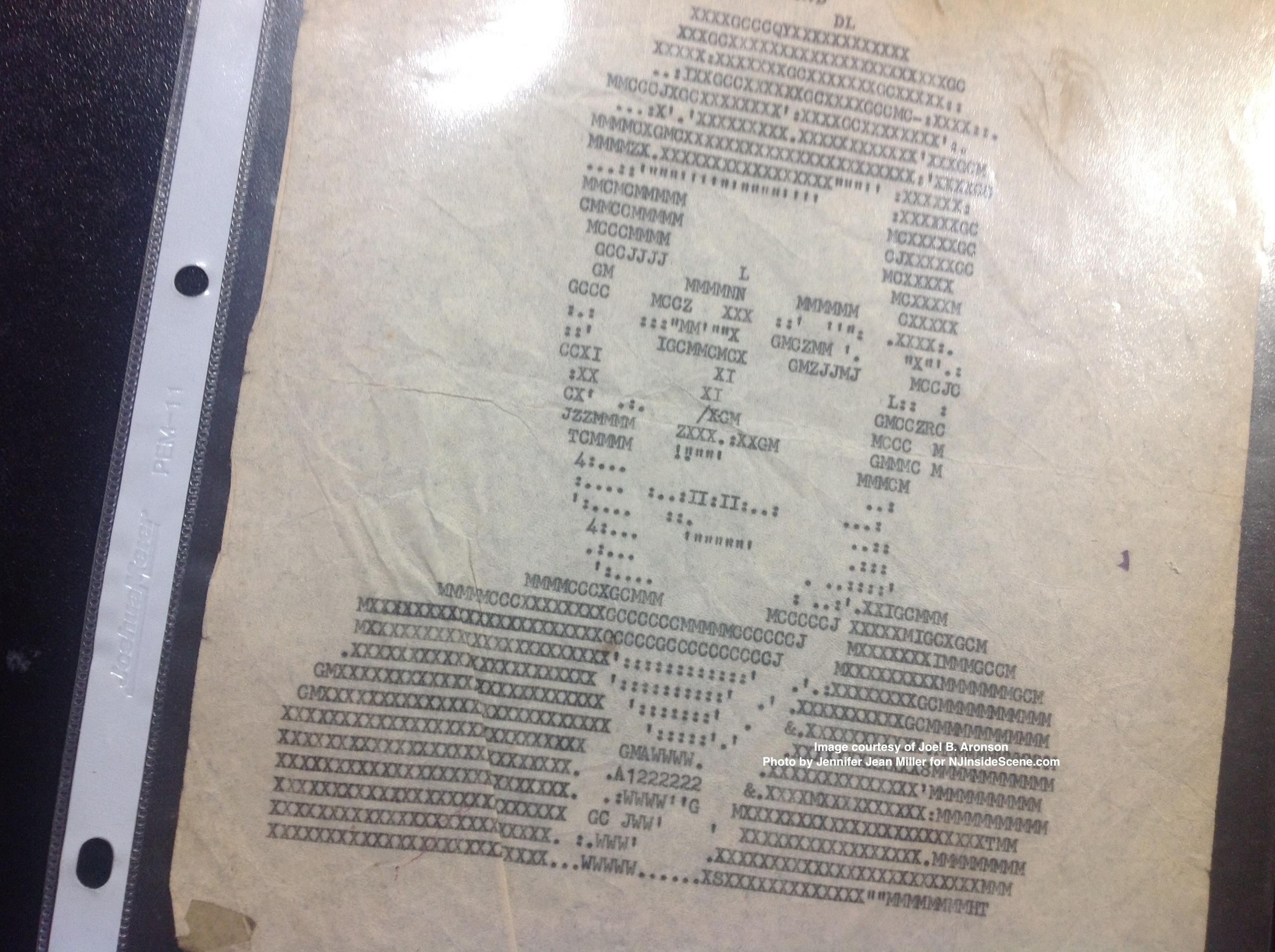
The onion skin typewriter portrait of JFK, created by an unidentified airman in Taiwan, during his presidency.
One morning around early 1961, he returned to his post as shift supervisor, and found something curious on one of the typewriters they used for their translations. It was an onion skin paper (used because it was light enough to mail without a lot of cost), which now had a typed out portrait of the bust of JFK.
“It was a quiet night,” he said, “and some anonymous person who wanted to keep occupied and look awake did this portrait.”
My father never found out who the person was, and he asked if he could take it. It has remained on his person since, living wherever he has lived.
“Whoever did it,” he said, “understood the technique. Where there are thick shadows [in JFK’s portrait], they used large x’s, in smaller areas, they uses m’s.”
He also feels the creator of the image, was someone who held a deep devotion for the President, as they all did.
Around this time in Taiwan, Vice President Lyndon B. Johnson and his wife, Lady Bird, visited Taiwan. At this time, my father also worked part-time as a press photographer, and had the opportunity to take their photos, receiving a letter of thanks from Lady Bird Johnson, after he sent her a photo.
Upon his return to the United States, my father ended up in Washington, DC., to take classes at Georgetown at the Institute of Language and Linguistics. He continued to work as a photographer while attending school, and did so at the Washington Wax Museum. Across the street from the Wax Museum, was a garage where President Kennedy’s limousines were kept.
“Washington was certainly an exciting place to live in those days,” my father recalled in a piece that The Daily Record printed about his 1988 recollections of JFK.
His history professor helped the President to write, “Profiles in Courage,” and many lectures talked about the president.
Down the hall from his apartment lived Theodore Sorenson, JFK’s chief of staff. The two would pass each other and say hello in the elevator.
One morning my father asked him, “How’s the country going these days, Mr. Sorenson?”
“Not bad, but it’ll be better after I get to my office,” Sorenson chuckled in reply.
His path also crossed with Secretary of State Dean Rusk, because my father’s friend Georgia was Rusk’s children’s babysitter.
On Thursday, Nov. 21, 1963, my father was at work at the Wax Museum at about noon, when he spotted a helicopter fly overhead. It was JFK’s heading to the White House, to retrieve him and escort him to Airforce One, to fly him out for a trip to Texas, he would later learn.
The next day, my father slept in, and his roommate called him at about 11 a.m. to ask him to retrieve the mail, noting how warm it was outside, and there was an eerie quiet in the air. He headed out at about 1 p.m., and drove to Sears to pick up some tools, then passed by the television sets, which were all turned to Walter Cronkite, appearing very flustered. Along with others, my father stopped and dropped everything, to watch the events unfold about President Kennedy’s assassination.
His stepfather was in Dallas that day on a business trip, and he was concerned. When my father learned that his stepdad was safe, he asked if he had picked up a newspaper. His stepdad replied that he had forgotten to save one.
My step-grandfather recollected later, “It seemed as if the world ended that day in Dallas.”
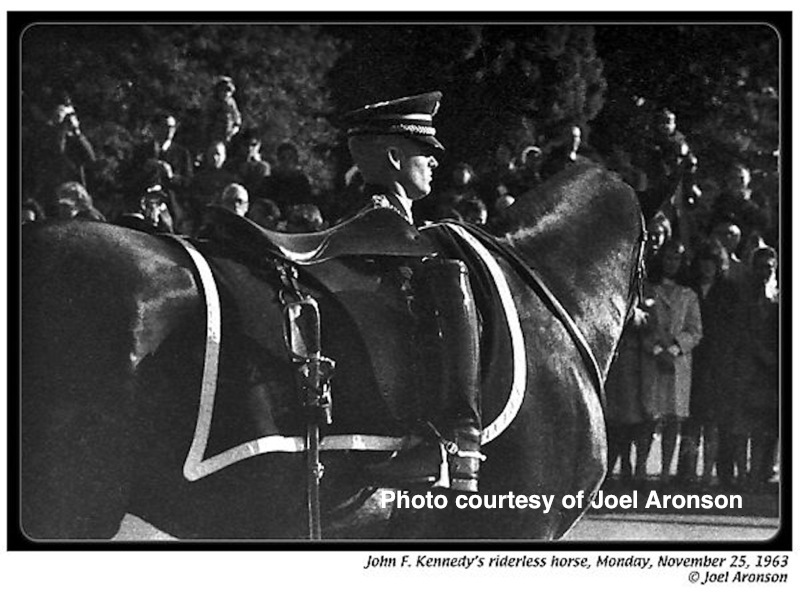
The Riderless Horse at JFK’s funeral. Photo courtesy of Joel B. Aronson.
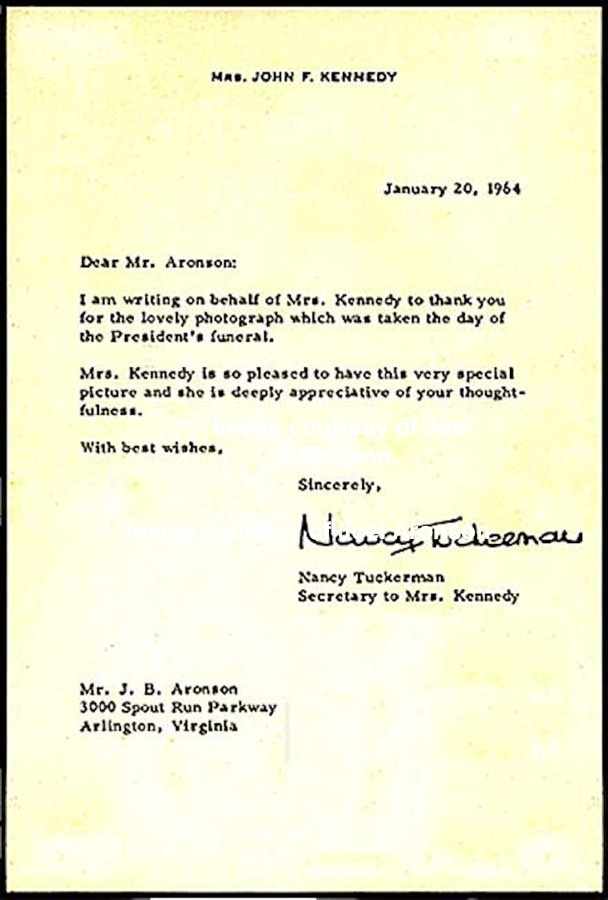
Letter from Jackie Kennedy’s secretary, courtesy of Joel Aronson.
Like everyone, over the next few days, the streets were empty as everyone decided to stay home and remain glued to the non-stop television coverage. When the funeral took place, my father took some photos of the procession, including one of the riderless horse. My father brought a copy of the emotional photo as a gift to Mrs. Kennedy, and her secretary sent a letter of thanks.
He never saw Theodore Sorenson again, and Sorenson’s shades were always drawn.
The men who waxed JFK’s limos across the street from the wax museum, he recalled, remained briefly following the President’s death, and were often viewed as they held their heads in their hands, solemnly.
Several years later, my father had a third important letter arrive in the mail, one from JFK’s brother, Bobby. My father sent RFK a copy of the onion skin portrait, and he was extremely moved. Sadly, less than a year following the letter’s date, RFK would also be dead from an assassin.
These letters are treasures to him, that are a testament to his colorful experiences.
Just recently, my father was able to fulfill one unfulfilled wish from that time period – to obtain a copy of the newspaper from that day. The Dallas Morning News has recently run a reprint of their Nov. 23 edition, the day following the passing of JFK. To watch my father’s emotion as he read the paper, for me, offered a different perspective. Here I was, able to see his reaction, as he put all the pieces together from that day. For those of us who were not there, it is easier for us to form the retrospective, than for those who were swirling within that time, and then had to step out and back for a view.
How did JFK’s death change my father’s life?
Having been a linguist, for him to hear the words, “The President has just been shot,” were some of the most powerful.
“’Shot’ means murder,” he said. “Going from that time, it was a nice day in November. I was thinking, “it can’t be true, no!’”
He compared JFK’s death to that of John Lennon. He took us by the Dakota after John Lennon’s passing when I was a little girl, where we paid our respects to the talented musician’s memory.
“JFK symbolized peace like John Lennon,” he continued. “Most liked him.”
“What goes through the mind,” he said, “is, ‘what is wrong with these people?’ To them, vengeance is more important than living a comfortable life.”
“It was sudden and totally not expected,” he said. “I kept thinking I couldn’t believe I was alive and witnessing this. I can’t get it out of my mind that I lived through that and experienced a little bit of that. And then put on top of all the horrendous things that happened to the Kennedy family.”
“He was an important person in the world,” my father added. “Not too many people have suffered being killed in full view of millions of people [in the films shown after].”
How did this event change him?
“It was a sad day,” he concluded, “and taught me to be on guard for anything. To be connected in intelligence is part of my training. You have to keep on guard for anything, anywhere, that can go wrong. I am always on guard about strange things.”
Hank’s JFK Memories
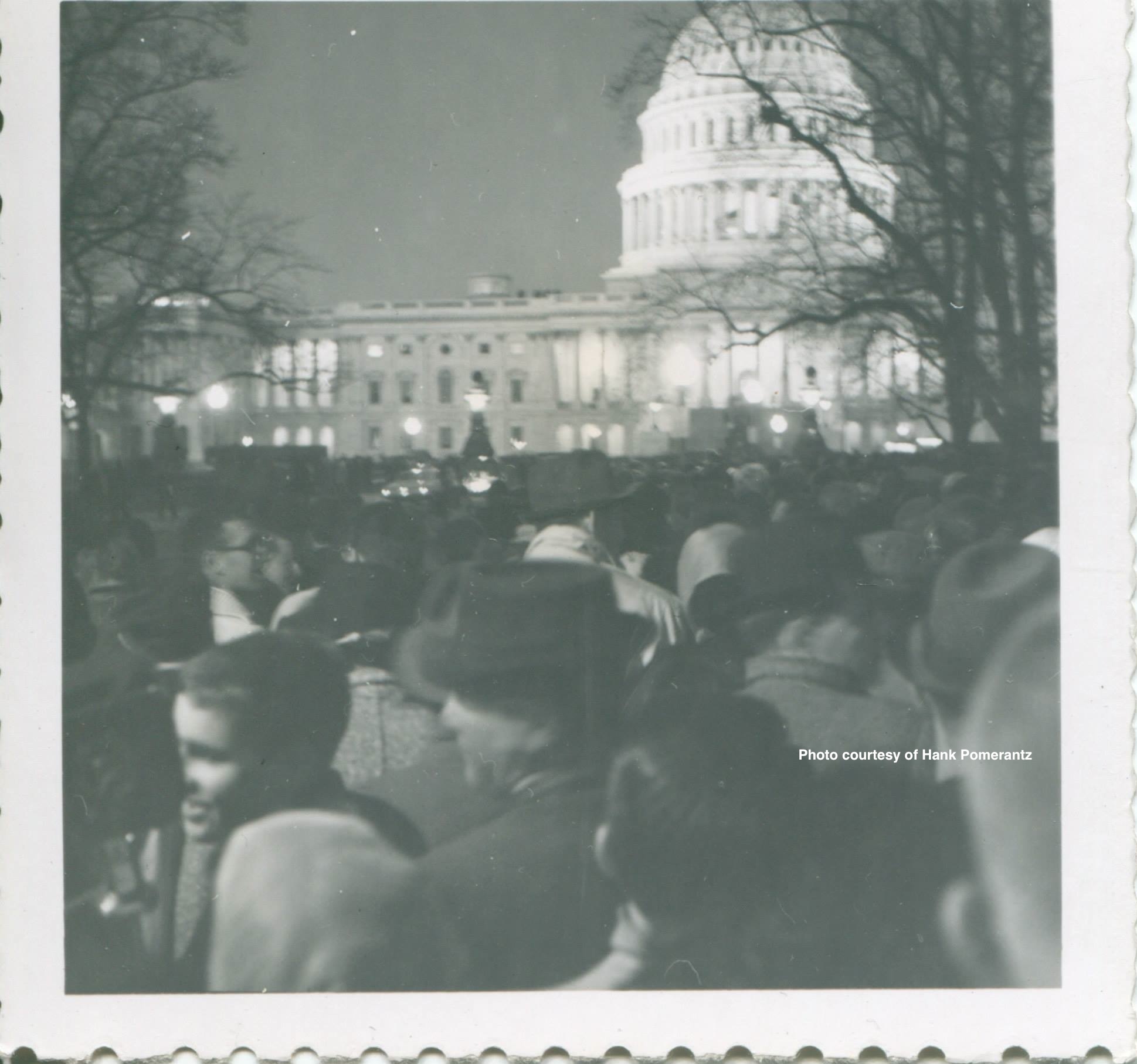
Washington DC, after the death of JFK. Photo courtesy of Hank Pomerantz.
Hank Pomerantz, now a professor at Sussex County Community College, was a student with his future wife at Montclair State University (then known as Montclair State College) in 1963.
Like my father and others, he was shaken up by the Bay of Pigs, and looked towards JFK as a beacon of hope.
“This was the first young President for us young people,” Hank said. “Before that, it was dinosaurs.”
He and his wife-to-be were on campus when they learned of JFK’s assassination. They were all shaken up, and especially more so, when Jack Ruby shot Lee Harvey Oswald. It was then that the couple, along with another couple (not romantically involved), made a split second decision to drive to Washington for JFK’s funeral.
“The world was upside down,” he said.
It was crowded and cold in the city. Hank remembers his hands were freezing as they stood outside shivering, and the ladies brought along dresses that they changed into. The foursome was some of the last allowed to enter into the Rotunda to see the President’s casket in state, after waiting on the long line.
“The crowd was really deep,” Hank said of the funeral, where he took photos as well. They headed towards the entrance of Arlington National Cemetery for photos, and watched the procession pass by.
On the way back to New Jersey, the cars were waved through the Parkway and the Turnpike, and tolls were not taken on either roadway. Hank stopped back to Irvington to his parents’ home, where he picked up food and cash.
“It was an unbelievable time in our lives,” said Hank of the entire experience. “We had to go if we were ever to heal.”
Mike’s JFK Memories
Mike Kennedy (not related to JFK), was working in Santa Barbara at the fisheries in 1963.
Of Nov. 22, 1963, he said, “I decided to stay home that day and not go to work, why I don’t know.”
Karen, his neighbor from across the street, stopped by to tell Mike and his roommate Howard, that the President had been shot.
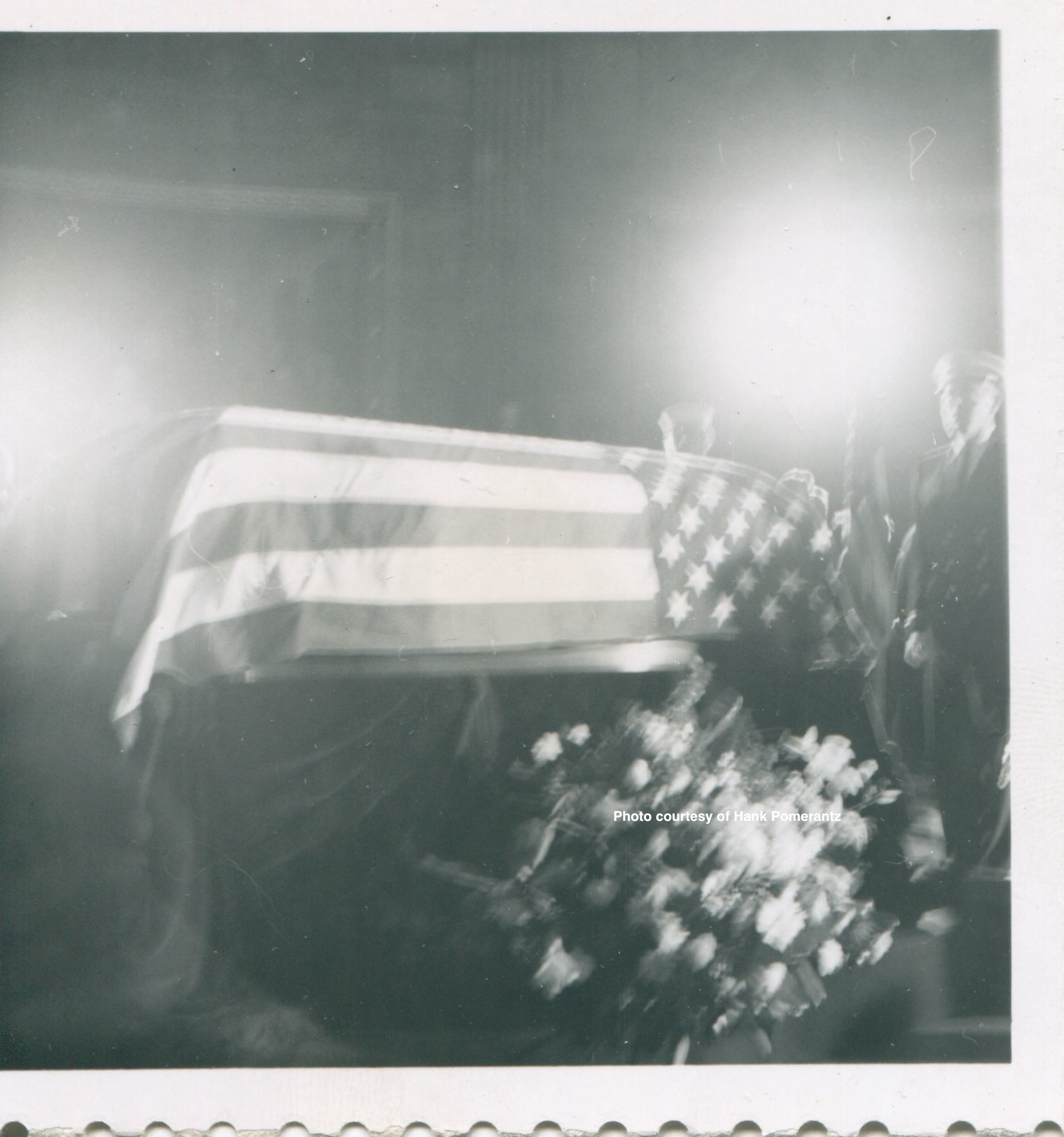
President John F. Kennedy’s casket in the Rotunda. Photo by and courtesy of Hank Pomerantz.
“I couldn’t believe it, I turned to Howard and said, ‘Howard, don’t we have a gallon of wine underneath the sink?’”
Mike and Howard began drinking wine, and glued themselves to the TV set. From there, others in the neighborhood came by, with the adults bringing adult beverages to drink, and they drank and discussed the tragic event.
A local band then arrived, and began playing, he said. Even police officers would stop by when they were off duty.
“My gosh,” Mike reminisced, “what a party, two bands lasted for three days and four nights mourning the death of President Kennedy.”
Jessi’s JFK Memories
“I am still traumatized by JFK’s assassination,” Jessi Paladini stated.
She was in eighth grade at the time, with what she described as a horrible teacher. A messenger had come around their classroom to tell them that the President had been killed.
“Right after reading the note, the teacher told us to go back to work,” she said.
After taking the bus following school, Jessi headed for her piano teacher’s home for a lesson, and found her teacher crying. Her teacher told her she was too upset to hold their lesson.
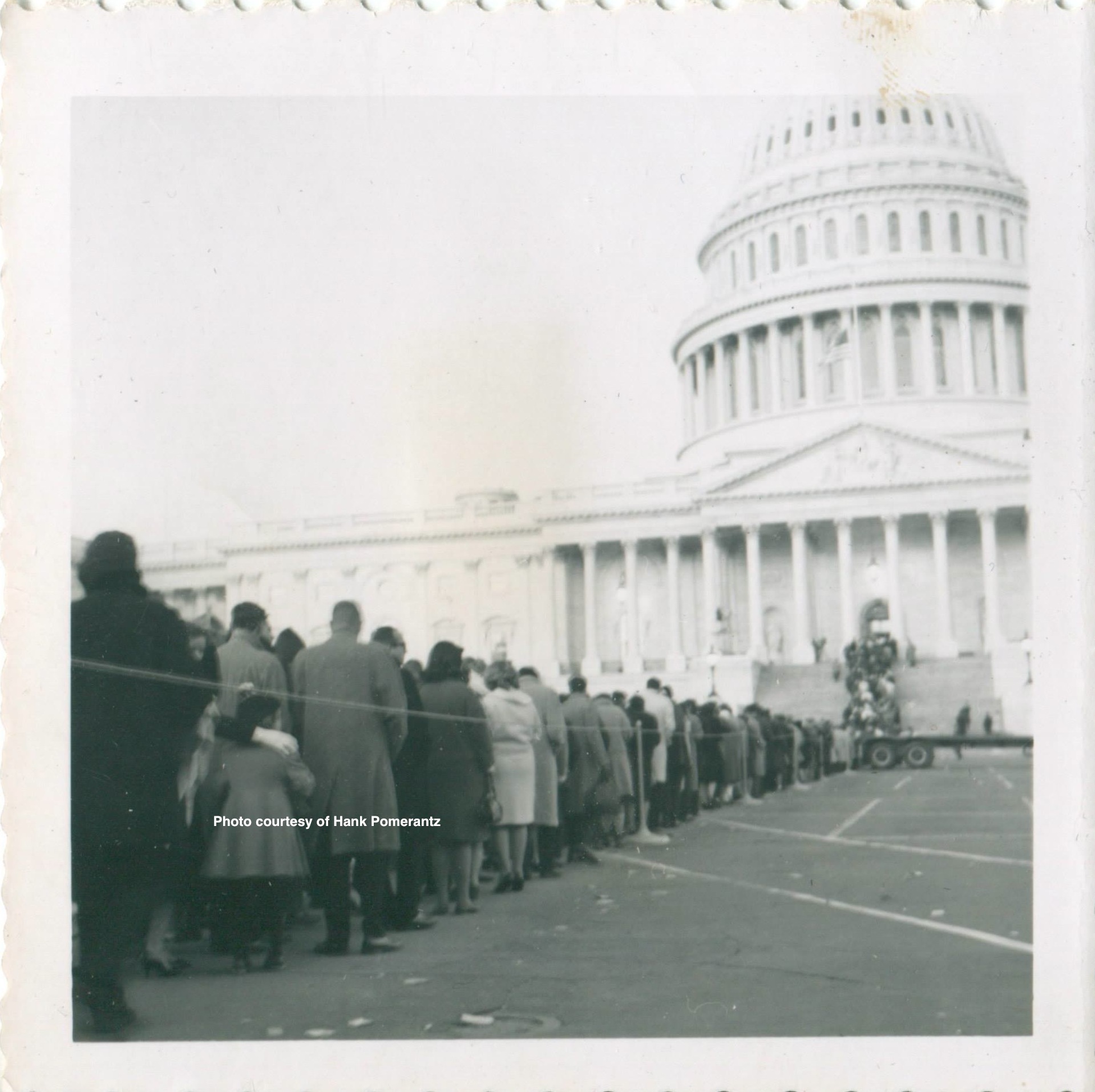
The line stretching outside to view JFK’s casket. Photo by and courtesy of Hank Pomerantz.
“I went home and watched the television for the next four days of my life,” said Jessi. “That’s when I fell in love with Jacqueline and her children.”
Jessi became a fan of Jackie Kennedy following the President’s death.
“I can’t read enough about Jackie,” she said. “I have many books.”
She compares Jackie Kennedy to Princess Diana, in some ways.
“They both had a profound impact on the world,” she said. “It’s not so much that they did great things or were Godly women, or anything so amazing, they were just classy women, and the world loved them. My mother always used to say that Jackie’s children were the only Kennedy children that grew to be such respected and admired individuals, and that is a credit to the mother who raised them. I was very sorry of John-John’s death when it occurred, because it seemed so senseless and sad.”
How did JFK’s death change her?
“I think it made me realize how vulnerable we are as a country,” she said. “It made me realize for the first time that foreign enemies are very real and will put us in harm’s way. That’s probably why President Kennedy’s death and 9-11 (a much grander scale of terrorism/murder) are two of the most traumatic events of my lifetime.”
“It was truly a very traumatic event to see a President killed during your lifetime, and especially since I was so young,” she said.
Bill’s JFK Memories
Bill Weightman was ten years old, when he met JFK in late 1959, or early 1960, when he stopped at the Teaneck Armory while campaigning.
“I had always been a Democrat,” said Bill, who recently ran for Assembly in New Jersey’s 24th Legislative District, on the Democratic ticket.
His father was Irish Catholic and a Democrat, and his mother, Italian and Republican.
“My dad was optimistic about Kennedy,” he said.
“It had a great impact on me,” Bill said of meeting the future President.
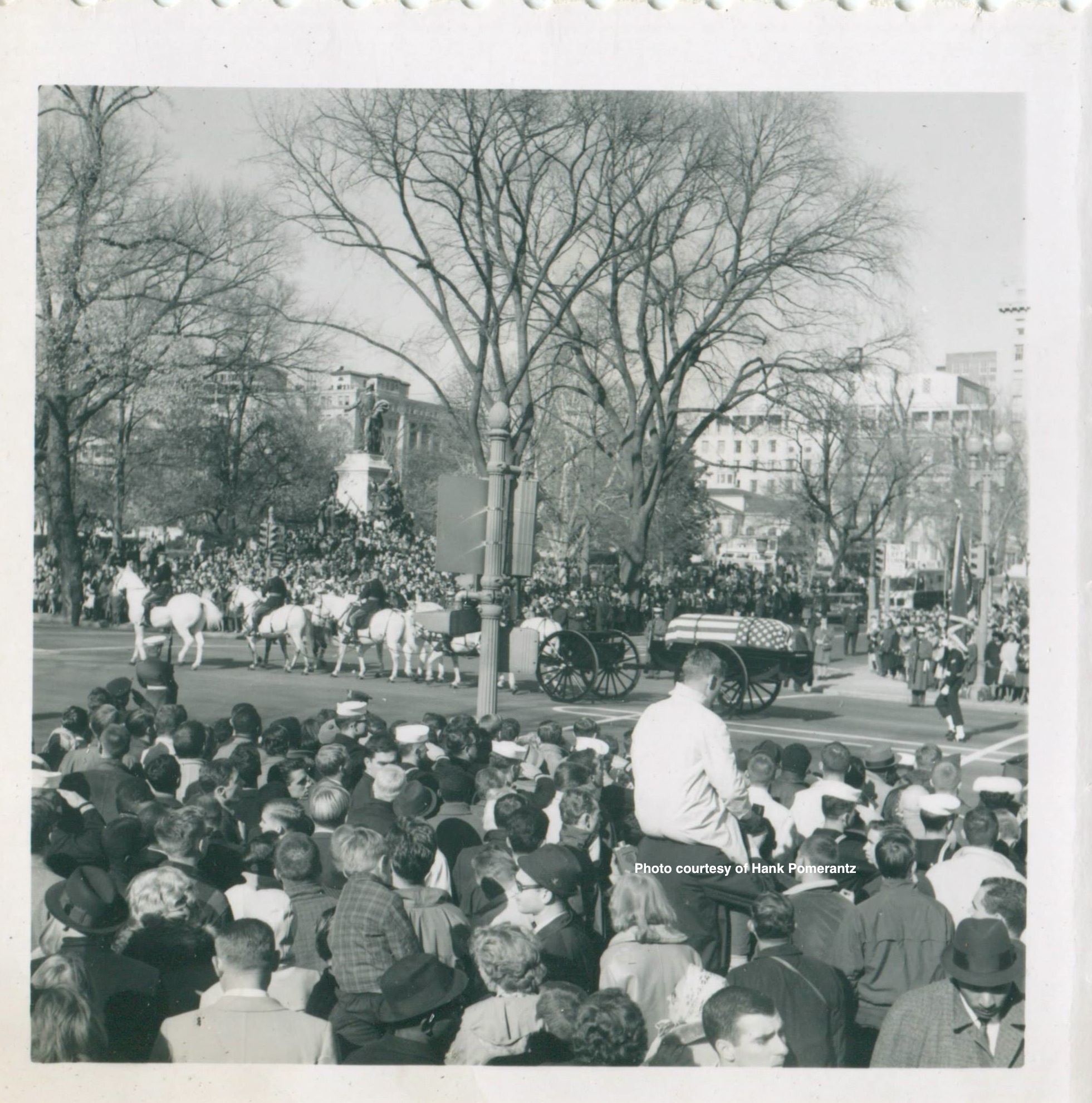
The crowd watches as JFK’s casket is taken to the cemetery. Photo by and courtesy of Hank Pomerantz.
Bill said he was shocked as he met the great leader, he shook his hand and said, “hello,” and JFK returned his greeting with a smile.
“It was something to remember,” Bill said of that day.
“In course of that, I got active at a young age,” he added.
Naturally, there was a divide in his household, with his mother voting for Richard Nixon.
“Everybody loved Kennedy,” said Bill of JFK.
He remembered sitting in eighth grade biology class on Nov. 22, 1963, when the announcement of the President’s assassination was made.
“We went home from school, many of us in tears,” Bill recalled.
From there, everyone sat around for the next few days, like everyone else interviewed for this story, to stay tuned to their television sets.
After returning to school, there were several bomb scares, something he said had never happened before.
“We got to know fear,” Bill said.
He described the Kennedy Administration as “the best and the brightest,” though he felt there were some mistakes in foreign policy made. Bill believes Kennedy would have pulled out of Vietnam, and was upset about the Cuban Missile Crisis.
Following JFK’s death, Bill had the opportunity to cross paths with those associated with JFK.
Like my father, he had the chance to meet Theodore Sorenson, though he spent time with him on a deeper level, once meeting with him for six hours.
“It was such a pleasure,” he said.
He also had the opportunity to meet RFK and Ted Kennedy, as well as RFK, Jr.
Of the three brothers, Bill looked up to RFK the most, and ended up working on his campaign.
However, he will always revere JFK’s place in history.
“Politics was never the same,” he added, especially of JFK’s perseverance.
He vowed he would put a man on the moon, and after his death, it happened.
We don’t have that can do spirit,” Bill said. “He was ahead of the times, he had enthusiasm. When he died, I think that was sucked out of us.”
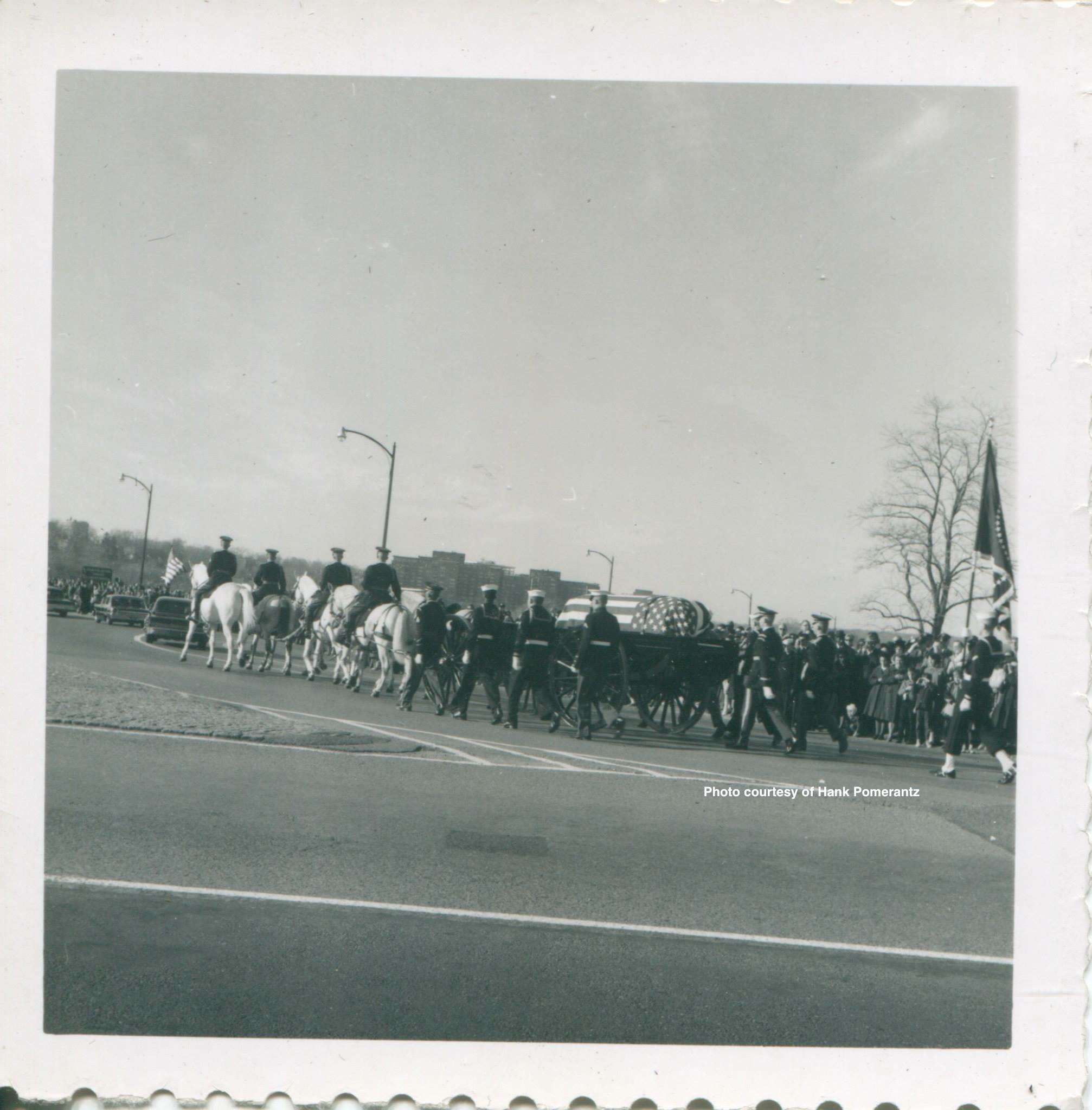
JFK’s flag-draped casket on the way to the cemetery. Photo by and courtesy of Hank Pomerantz.
Do you have a JFK Remembrance? Feel free to comment here, or, post your remembrances on the article link on our Facebook page.

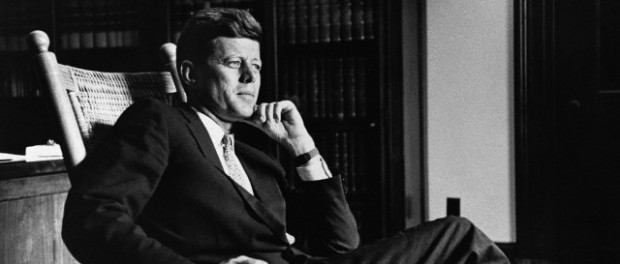

Leave a comment
You must be logged in to post a comment.